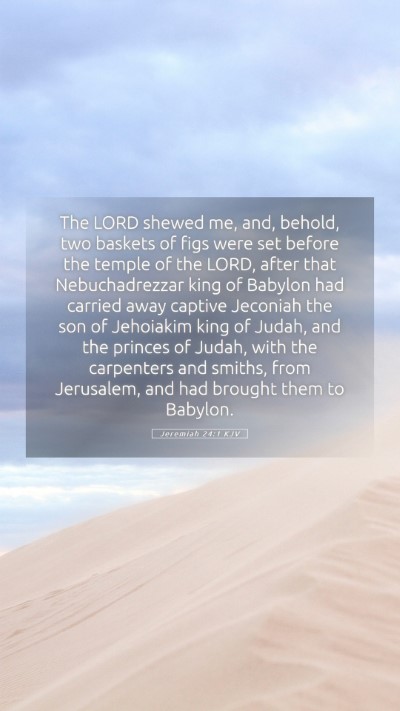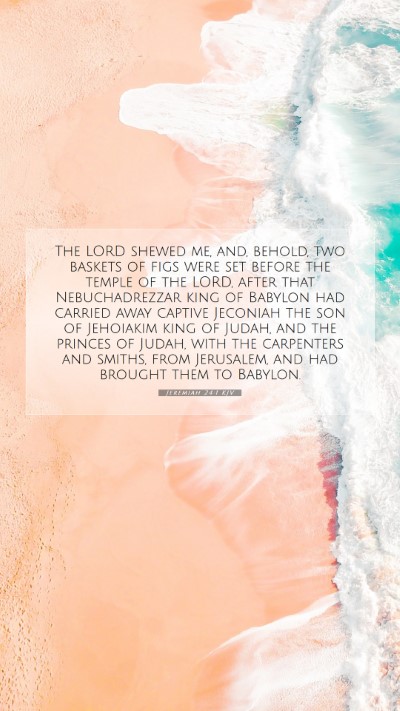Understanding Jeremiah 24:1
Jeremiah 24:1 provides a vivid narrative that illustrates a critical moment in the history of Israel during the Babylonian exile. In this chapter, the Lord reveals a compelling vision to Jeremiah involving two baskets of figs. This vision serves as a profound metaphor, encapsulating the fate of the people of Judah.
Bible Verse Meaning
This verse is structured around an encounter in which God shows Jeremiah two baskets of figs set before the temple of the Lord, one basket containing very good figs and the other very bad figs, which could not be eaten. This dichotomy mirrors the condition of the Israelites at the time, highlighting themes of judgment, hope, and restoration.
Biblical Exegesis
To understand the implications of this passage, we must consider the historical context in which it was written. Jeremiah prophesied during a tumultuous period, emphasizing the need for discernment among the people regarding their spiritual state and their trajectory as a nation. Through Jeremiah’s vision, God delineates His people into two distinct groups: those who would be preserved and restored and those who would face consequences for their unfaithfulness.
Commentary Insights
- Matthew Henry: Henry emphasizes that the good figs represent those who would remain faithful and rely on God's promises, highlighting God's mercy towards the faithful even in a time of judgment. The bad figs symbolize those who would experience destruction due to their rebellion against God.
- Albert Barnes: Barnes points out that the good figs reflect the exiles who would be brought back and restored, signifying God's commitment to His covenant people. The bad figs, conversely, represent those who have hardened their hearts and will face dire consequences, illustrating the clear contrast between obedience and disobedience.
- Adam Clarke: Clarke provides insight into the nature of hope amid despair, noting that the good figs signify revival and hope for the future. He argues that despite the dark circumstances, God's grace offers the opportunity for redemption to those who turn back to Him.
Meaning of Bible Verses in Context
This verse illustrates a broader theological principle that operates throughout the Scriptures: God always gives His people a chance to repent and be restored. The vision of the figs serves to communicate God's sovereignty over the fate of His people and His ultimate purpose, which is to draw them back to Himself, fulfilling His promises.
Applications for Today
Jeremiah 24:1 teaches significant lessons for modern readers regarding discernment and faithfulness. Just as the Israelites were faced with choices reflecting their loyalty to God, contemporary believers must also evaluate their spiritual condition and the direction of their lives.
Practical Insights for Bible Study
- Self-Reflection: Consider your own spiritual state in relation to the good and bad figs. Are there areas in your life where you need to align more closely with God?
- Encouragement: This passage provides hope; it assures us that God desires restoration for His people. Just as He cared for the exiles, He cares for us today.
- Community Application: In Bible study groups, this verse can foster discussions on collective loyalty to God's ways and the importance of supporting one another in faithfulness.
Cross References
Several other scriptures resonate with the themes found in Jeremiah 24:1:
- Jeremiah 29:11: A verse that reaffirms God's plans for hope and a future for His people.
- Ezekiel 18:30: A call to repentance that parallels the theme of restoration in Jeremiah.
- Romans 11:5-6: Discusses the remnant of grace, echoing the principle of preservation amidst judgment.
Conclusion
Jeremiah 24:1 serves as a profound reminder of God's unyielding commitment to His people, delineating clear paths of judgment and restoration. This passage encourages deeper Bible study insights and provides a rich opportunity for understanding Scripture. As believers engage with this verse, they are prompted to reflect on the condition of their hearts and the choices they make in light of God's enduring faithfulness.


